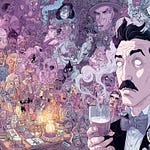I was at a dinner the other night with a buddy who is a much cleverer investor than I am. The conversation went something like this.
Clever Mate: “Inflation is 10%. Rates are going to have to go to 10% to get it under control. I’m 60% in cash.”
Me: “The system can’t take rates at 10%.”
Clever Mate shrugs.
There is an awkward silence.
Clever Mate: “It will have to.”
Another more awkward silence follows as I digest the implications.
Do central bankers have what it takes to tackle inflation?
Have today’s central bankers – the liof Jerome Powell, Christine Lagarde and Andrew Bailey – got the bottle to “do a Volcker” and put rates up to these kinds of levels? (In 1981, then-Federal Reserve chairman Paul Volcker raised the Fed Funds rate to 20%.).
It’s not just the chair or the governor, of course – though they will be the ones making the announcement – but the boards behind them. To make such a decision, with such ramifications, would not just require extraordinary bottle, but extraordinary conviction as well. It’s hard to have one without the other.
I’m not sure Bailey or Lagarde have the right belief systems. In the case of Lagarde, I’m as sure as dammit the career and reputational risk would be intolerable to her.
So my view, on this side of the Atlantic at least, is that a softly, softly approach will prevail and that rates will go up slightly, while those in charge prevaricate and hope that this unfortunate inflationary episode does prove to be temporary and passes.
We will have a clearer idea of Powell’s intentions later this week when he makes his announcement.
But here’s the point. Volcker is widely credited with curtailing the inflation of the 1970s. However, when he was appointed in 1979, inflation was long entrenched. From the Vietnam War to the abandonment of the gold standard in 1971 to the oil crisis of 1973 and through all the economic turmoil of the 1970s, inflation was not something new or just a few months old, as this episode is today.
Volcker’s hiking of rates came off the back of a decade of this and, what’s more, President Carter appointed him specifically to do what he did.
Even against all of that, his actions still provoked enormous ire.
Today’s central bankers do not have the same backdrop. The inflation narrative is too new, and there is still the hope that this is all temporary. So my forecast is for them to do the least possible for now, with Powell probably remaining the boldest of the three.
Rates may have to go to 10%, as my buddy argues, but the stage is not yet set – and this current pullback in commodities may give them some respite.
Inflation redefined
I had a thought in the shower this morning, as you do, and it was this.
The classic definition of inflation, as regular readers will long since know, is “the expansion of the supply of money and credit with the consequence of higher prices.” You inflate – blow up – the money supply and, as a result of there being more money about the place, prices go up.
However, because of semantic shifts (which is a high-falutin way of saying “a shift in the meaning of language over time”) this is no longer the definition of inflation. Inflation now just means “higher prices”.
Somewhere along the line, whether due to a conspiracy by central planners and bankers is not known, the bit about expanding the supply of money and credit got dropped.
The semantic shift has gone a stage further still. Inflation no longer means just rising prices, but rising prices of goods and services included in the core price index (CPI) measure of inflation.
So house prices rising, for example, doesn’t mean inflation.
It’s nuts because, as we know, the main reason house prices go up is because of an increase in the supply of money and credit – more and cheaper mortgages.
However, such semantic shifts are beyond the power of this lowly writer to control. So there is little more I can do than rage, rage against the dying of the light, then go about my day.
Anyway, I’ve got through the preamble, so here’s the thought.
Inflation, by its modern definition, actually leads to a shrinking of the money supply, or at least it should do, if central banks follow their remits to curb it.
If inflation is 10% then rates go up to curb it (though perhaps not as high as 10%). As rates rise, many deleverage and pay down debt. (Leverage is another means by which money and credit are created). If rates rise a lot, this can become a scramble.
In other words, with inflation (by today’s definition) the supply of money and credit contracts. That means asset prices – house, bond and equity prices – fall, as they are what we use leverage to buy. Even car prices. (Finance costs more).
These are mostly not included in CPI, but in such a deflationary event as interest rates rising to levels concomitant with current CPI inflation, you can expect CPI to fall too.
To summarise, inflation originally meant the expansion of the money and credit supply with the consequence of higher prices. Today inflation, and the central bank reaction to it, portends the contraction of the supply of money and credit with the consequence of lower prices.
That is some semantic shift.
I don’t know how central bankers get us out of this. But no doubt all sorts of plans with even longer and more unpronounceable names than quantitative easing (QE) are being formulated as we speak.
Remember how they suddenly came up with QE in 2008? We all looked on baffled and blindsided. Except similar rabbits to be pulled out of hats.
Dominic will be performing his show, How Heavy?, a lecture with funny bits about the history of weights and measures, at the Edinburgh Fringe this August. You can get tickets here.













